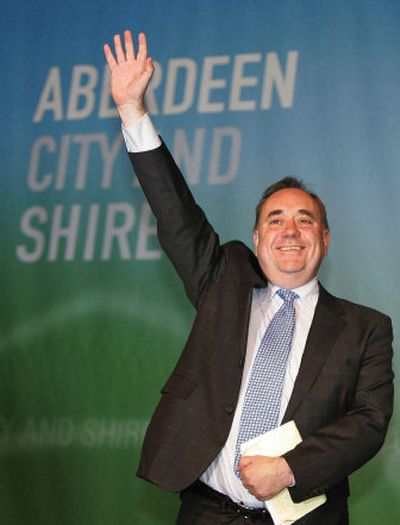Scottish nationalists win at the ballot box

LONDON – Scottish nationalists pushing for independence pulled ahead to an unprecedented victory in the Scottish parliament Friday and said they would seek to form a new coalition government committed “to all the people of this ancient and proud nation of Scotland.”
Amid chaotic vote counting that saw as many as 100,000 ballots disqualified, the Scottish National Party gained 20 seats in the 129-seat assembly, leaving it with 47 seats to the 46 seats won by the Labor Party, which has dominated politics in Scotland for the 50 years.
“The Labor Party has no moral authority left to govern Scotland,” party leader Alex Salmond said.
But in an effort to quell nervousness about the party’s election pledge to seek a referendum on independence by 2010, he said, “My approach … will be one of good will.”
The party’s most obvious potential coalition partner, the Liberal Democratic Party, opposes a breakup of the United Kingdom and has said it will oppose a referendum. SNP leaders have said they would consider putting additional questions on a referendum ballot, such as seeking additional home rule powers for Scotland, in an effort to win allies for a new a government.
The nationalists’ strong showing reflected Labor setbacks across Britain. The party lost 485 seats in local council elections in England, while the Conservatives, making some limited gains in Labor territory in northern England, gained 875 seats with about 40 percent of the vote.
“You always take a hit in the midterm, but these results provide a perfectly good springboard to go on and win the next general election,” said Prime Minister Tony Blair, who is expected to announce his timetable for departure next week.
Conservative leader David Cameron called the results “a big breakthrough” that included some of Labor’s traditional territory in the north.
Vernon Bogdanor, professor of government at Oxford University, said the size of the Conservative vote is “just about what they need to form a government with a small majority (in the general elections). But you could argue at this stage that they should be doing better. They need to show consistency.”
Bogdanor said there was “not the slightest chance of Scotland seceding from the United Kingdom,” despite the SNP’s strong showing. “Even the polls showing SNP voters at 30 percent, that means a 70 percent vote for unionist parties,” he said.
The results were clouded by the disqualification of tens of thousands of ballots in Scotland, most rejected because voters, apparently confused by the complication of the two-page, three-step ballot, marked them incorrectly. In several races, the discrepant ballots were so numerous they exceeded the margin of victory.
There were also problems in a few constituencies with electronic counting equipment, and delays in verification of mail ballots.
SNP leaders and the Scotland Office, the country’s representative in Westminster, demanded an investigation.